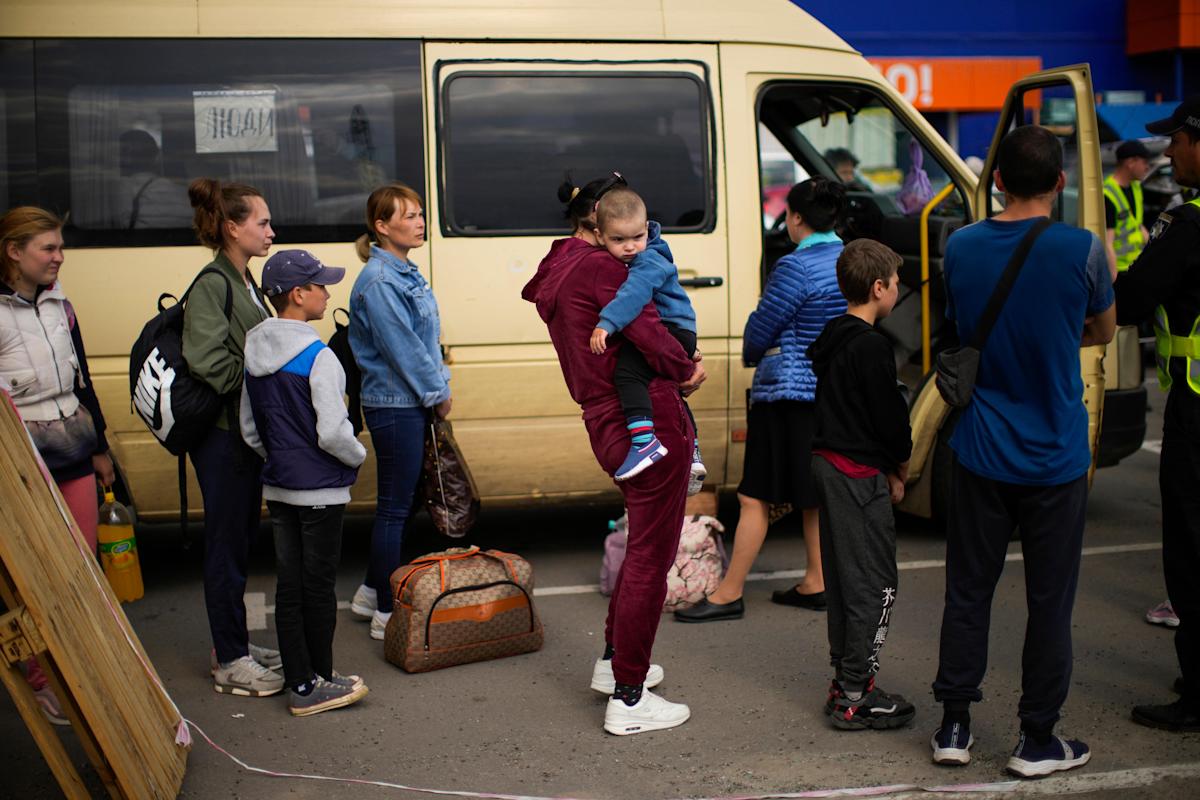
ZAPORIZHZHIA, Ukraine (AP) — Russian forces began storming a sprawling steel plant in the besieged port city of Mariupol on Tuesday, Ukrainian officers said, as a convoy carrying dozens of civilians evacuated from the facility over the weekend arrived in the relative safety of a Ukrainian-controlled city.
Osnat Lubrani, the U.N. humanitarian coordinator for Ukraine said in a statement that, thanks to the evacuation effort, “101 women, men, children, and older persons could finally leave the bunkers below the Azovstal steelworks and see the daylight after two months.”
The news for those left behind was more grim. The deputy commander of the Azov Regiment holed up in the plant told The Associated Press that Russian forces were storming the facility, which includes a warren of underground tunnels and bunkers. Another Ukrainian officer confirmed the assault on Ukrainian television.
“The enemy is trying to storm the Azovstal plant with significant forces using armored vehicles. Our fighters are repelling all attacks,” said Denys Shlega, commander of the 12th Operational Brigade of Ukraine’s National Guard who is also currently at Azovstal.
The assault began almost two weeks after Russian President Vladimir Putin ordered his military not to storm the plant, but rather block it off.
It also came as the first convoy of evacuees from the plant arrived in the Ukrainian-controlled city of Zaporizhzhia, some 140 miles (230 kilometers) northwest of Mariupol.
At a reception center, stretchers and wheelchairs were lined up, tiny children’s shoes dangled from a shopping cart and a pile of toys waited for the first convoy of civilians whose evacuation is being overseen by the United Nations and Red Cross.
The arrival of buses and ambulances was a rare glimmer of good news in the nearly 10-week conflict that has killed thousands, forced millions to flee the country, laid waste to towns and cities, and shifted the post-Cold War balance of power in eastern Europe.
“Over the past days, travelling with the evacuees, I have heard mothers, children and frail grandparents speak about the trauma of living day after day under unrelenting heavy shelling and the fear of death, and with extreme lack of water, food, and sanitation,” Lubrani said. “They spoke of the hell they have experienced since this war started, seeking refuge in the Azovstal plant, many being separated from family members whose fate they still don’t know.”
In addition to the 101 people evacuated from the steelworks, another 58 people joined the convoy in a town on the outskirts of Mariupol, Lubrani said. Some decided not to travel all the way to Zaporizhzhia, where a total of 127 people arrived Tuesday, Lubrani added.
The Russian military said earlier some evacuees chose to stay in separatist areas. In the past, Ukraine has accused Moscow’s troops of taking civilians against their will to Russia or Russian-controlled areas — something the Kremlin has denied.
Mariupol has come to symbolize the human misery inflicted by the war. A Russian siege has trapped civilians with little access to food, water and electricity, as Moscow’s forces pounded the city to rubble. The plant — where about 1,000 civilians sought shelter in a warren of underground bunkers along with some 2,000 fighters who have refused to surrender — has particularly transfixed the outside world.
Deputy Prime Minister Iryna Vereshchuk told reporters Tuesday that a few hundred civilians remain at the plant — but it was unclear whether a new evacuation would be organized.
Even before word came that Russian forces were storming the plant, the military said it was bombarding it after Vadim Astafyev, a Defense Ministry spokesman, said that Ukrainian fighters used the cease-fire that allowed civilians to flee to take up new positions at the plant.
They “came out of the basements, took up firing positions on the territory and in the buildings of the plant,” he said. Russian troops along with the Moscow-backed separatist forces used “artillery and aircraft … to destroy these firing positions.”
After failing to take Kyiv in the early weeks of the war, Russia withdrew some of its forces and then said it would switch its focus to Ukraine’s eastern industrial heartland of the Donbas. Mariupol lies in the region, and its capture would deprive Ukraine of a vital port, allow Russia to establish a land corridor to the Crimean Peninsula, which it seized from Ukraine in 2014, and free up troops for fighting elsewhere in the Donbas.
Michael Carpenter, U.S. ambassador to the Organization for Security and Cooperation in Europe, said Monday that the U.S. believes the Kremlin plans to annex much of eastern Ukraine and recognize the southern city of Kherson as an independent republic. Neither move would be recognized by the United States or its allies, he said.
Russia is planning to hold sham referendums in the Donetsk and Luhansk regions in the Donbas that would “try to add a veneer of democratic or electoral legitimacy” and attach the entities to Russia, Carpenter said. He also said there were signs that Russia would engineer an independence vote in Kherson.
Getting a full picture of the unfolding battle in the east has been difficult because airstrikes and artillery barrages have made it extremely dangerous for reporters to move around. Both Ukraine and the Moscow-backed rebels fighting in the east have introduced tight restrictions on reporting.
But so far, Russia’s troops and their allied separatist forces appear to have made only minor gains, taking several small towns as they try to advance in relatively small groups against staunch Ukrainian resistance.
In its daily Twitter statement on the war, the British military said Tuesday it believes the Russian military is now “significantly weaker” after suffering losses in its war on Ukraine.
“Recovery from this will be exacerbated by sanctions,” the ministry said. “Failures both in strategic planning and operational execution have left it unable to translate numerical strength into decisive advantage.”
Ukraine’s resistance has been significantly bolstered by Western arms, and British Prime Minister Boris Johnson on Tuesday announced a 300 million pounds ($375 million) in new military aid — including radar, drones and armored vehicles.
In a speech delivered remotely to Ukraine’s parliament, he echoed the words of Britain’s World War II Prime Minister Winston Churchill as he lauded the country’s defiant response to the Russian invasion.
“The so-called irresistible force of Putin’s war machine has broken on the immoveable object of Ukrainian patriotism and love of country,” he said. “This is Ukraine’s finest hour.”
Pope Francis was quoted Tuesday in an Italian newspaper as saying that he offered to travel to Moscow to meet President Vladimir Putin about three weeks into the invasion. The pontiff told Corriere della Sera that he has not received a response.
Highlighting the toll of the war, Ukrainian President Volodymyr Zelenskyy said Monday that at least 220 Ukrainian children have been killed by the Russian army since the war began, and 1,570 educational institutions have been destroyed or damaged. He also noted that some people trying to escape the fighting are afraid they’ll be taken to Russia or Russian-controlled areas.
More than 1 million people, including nearly 200,000 children, have been taken from Ukraine to Russia, Russia’s Defense Ministry said Monday, according to state-owned news agency TASS. Defense Ministry official Mikhail Mizintsev said that number included 11,550 people in the previous 24 hours, “without the participation of the Ukrainian authorities.”
Zelenskyy said that the U.N. assured him people fleeing Mariupol would be allowed to go to areas his government controls.
Separate from the official evacuations, some Mariupol residents left on their own, often in damaged private cars.
As sunset approached Monday, Mariupol resident Yaroslav Dmytryshyn rattled up to a reception center in Zaporizhzhia in a car with a back seat full of youngsters and two signs taped to the back window: “Children” and “Little ones.”
“I can’t believe we survived,” he said, looking worn but in good spirits after two days on the road.
“There is no Mariupol whatsoever,″ he said. “Someone needs to rebuild it, and it will take millions of tons of gold.”
___
Associated Press journalists Inna Varenytsia and David Keyton in Kyiv, Jon Gambrell and Yuras Karmanau in Lviv, Mstyslav Chernov in Kharkiv, and AP staff around the world contributed to this report.
___
Follow AP’s coverage of the war in Ukraine: https://apnews.com/hub/russia-ukraine




